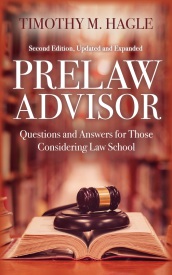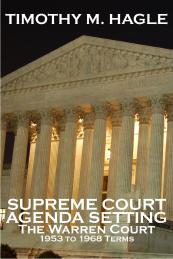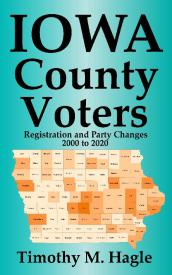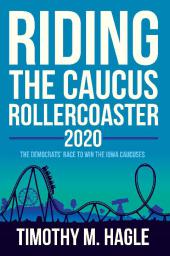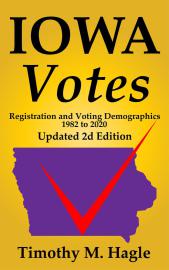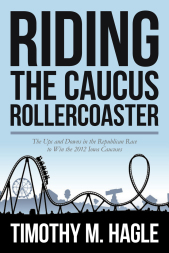
Contact Info
347 Schaeffer Hall
319-335-2348
timothy-hagle@uiowa.edu
Twitter: @ProfHagle
Fall 2024 Office Hours
Tue & Th: 4:45-6:15
Mailing Address
Dept of Political Science
341 Schaeffer Hall
20 E. Washington Street
The University of Iowa
Iowa City, Iowa 52242
News
Posted updated Prelaw FAQ for UI students
New Book, Riding the Caucus Rollercoaster 2024, published in paperback and for Kindle devices.
Posted updates to 12 papers in Iowa Voting Series for 2022 election data
New Book, Supreme Court Agenda Setting: The Warren Court, published for Kindle devices and computers with Kindle reader.
Published updated and expanded edition of Prelaw Advisor in paperback and for Kindle readers
My books
POLI:3120/30:158 The Criminal Justice System
This page contains the responses to the new questionnaire that I used for courses taught from the Fall 2015 semester on.
Prior to the Fall 2015 semester I had used my own questions for my teaching evaluations. I did this because I didn't think the standard questions on either the old SPOT or ACE forms got at things I wanted to know regarding the students' thoughts on the course. I also objected to the way the questions were structured. By that I mean that all the questions were phrased in positive terms and were on a six-point strongly agree to strongly disagree scale. Well-constructed surveys don't structure the questions in that way. In part, this is so that the person responding to the survey doesn't just automatically pick agree or disagree for everything, but must read and think about each question.
The process for administering teaching evaluations was moved online beginning with the Fall 2015 semester. Unfortunately, this meant that all instructors were forced to use a set of standard questions. Although instructors could add questions of their own, there were significant limitations in the form and format of such questions. As a result, the new questionnaire for my courses included three standard questions asked of all College of Liberal Arts and Sciences courses, 11 questions required by the Political Science Department, and 10 of my own questions. The response set for all these questions ranged from 6 = strongly agree, to 1 = strongly disagree.
Some of the Department questions were similar to those I had used on my old questionnaire. That allowed me to limit my added questions to only 10 while still covering most of the items contained on my previous questionnaire.
A Note on This Course: This course, along with POLI:3121 are the two courses that are at the sophomore/junior level. This course is mainly lecture and I stick very close to a text I use. The focus is on criminal law (elements of crimes, etc.) in the first half of the course and criminal procedure (e.g., search and seizure) in the second half. In the second half of the course the students also read a few Supreme Court opinions in addition to the text. This gives them an opportunity to learn to how to extract information from cases (which is not like reading ordinary textbooks). That will help for those going on to POLI:3101 or law school.
Reminder: The response set for all the questions below is 6 = strongly agree to 1 = strongly disagree.
N is the number of students who submitted the evaluation. The number in the (6) to (1) columns indicates how many students selected that option. The Mean is the mean score for that semester. The Dept Mean is the mean score for all instructors for that question across all courses.
CLAS Core Questions
These three questions are asked of all courses offered in the College of Liberal Arts and Sciences. Given the variety of subject matter and course structures they have to be pretty vague. That makes me wonder a bit about their usefulness.
The instructor was effective in teaching the course materials.
| Semester |
N |
(6) | (5) | (4) | (3) | (2) | (1) | Mean | Dept Mean |
| S 2016 | 15 | 7 | 1 | 4 | 2 | 0 | 1 | 4.67 | 5.05 |
| S 2017 | 13 | 7 | 3 | 2 | 0 | 1 | 0 | 5.15 | 5.23* |
| S 2019 | 23 | 5.09 | 5.14 | ||||||
| S 2020 | 4 | 4.00 | 4.96 |
I'm not sure how the student is to interpret "effective" here. In my Instructor Questions I as whether the student learned a lot in the course, but even with that wording it's still a matter of how much effort the student puts intot the course.
Spring 2020: This was the semester we had to go online on short notice. This seemed to cause an even worse response rate than usual as only four of 37 students did the evaluation. I talk more about this in my response to the written comments. It seems that the four students who did the evaluation were generally not happy with how the course ended up as they all also submitted written comments, which is unusual. One thing that's noticeable in the few responses is that the students are basing their evaluations on the second half of the course rather than striking a balance between the regular course in the first half and the online version in the second.
Spring 2019: There were 44 in the class and 23 filled out the evaluations. It seems that the evaluations I have access to no longer indicate how many selected each option for the various questions and we only see the course and department means. The powers that be don't like the low response percentage and keep tinkering with evaluations.
Spring 2018: Had a mild heart attack followed by heart surgery and had to give up this course for the semester. :(
Spring 2017: There were 31 in the class at the end of the semester, but only 13 did the evaluation. Still less than half, though a little better than the prior year. Still need to work on it. As in the previous semester several in the class pretty regularly played on their computers all the time. Even so, the overall grades in the class, especially the first test, were pretty good. *For some reason the department averages didn't appear for the three individual CLAS questions. The average for the three was 5.06, so I've estimated the individual scores based on the graph in the results.
Spring 2016: There were 38 in the class at the end of the semester, so an N of 15 is a little low even though this was the first year the evaluations were online. This was an interesting semester, and not in a good way. There were at least five students who had a really hard time paying attention in class. One was on his phone all the time and several others were clearly playing on their laptops. Attendance also dropped significantly after the midterm (though, oddly enough, those not paying attention were usually in class). As for the evaluations, one student just went through and marked 1 = Strong Disagree on every question. That is one of the reasons why the questions should not be all in the same direction.
The work assigned by the instructor was worthwhile and helped me learn the course material.
| Semester |
N |
(6) | (5) | (4) | (3) | (2) | (1) | Mean | Dept Mean |
| S 2016 | 15 | 5 | 4 | 4 | 1 | 0 | 1 | 4.67 | 4.90 |
| S 2017 | 13 | 7 | 1 | 1 | 1 | 0 | 2 | 4.69 | 4.90* |
| S 2019 | 23 | 5.09 | 5.02 | ||||||
| S 2020 | 4 | 3.50 | 4.82 |
The "work assigned" is pretty straightforward for this course. We basically cover a chapter a week out of a textbook. That makes it easy for the student to know what we will cover in class. My lectures stay very close to the text, which I think sometimes lulls students into not doing the reading before class. In addition to the readings, there is a paper assignement based on the readings.
Spring 2017: I'm interested in the two who found little value in the work assigned. Evaluations are anonymous, but it would be interesting to know after the fact which students didn't like the course in some way. Were they the ones who attended regularly and did all the work, or the ones who skipped a lot or played on their computers all the time.
The instructor supported student learning in this class.
| Semester |
N |
(6) | (5) | (4) | (3) | (2) | (1) | Mean | Dept Mean |
| S 2016 | 15 | 6 | 3 | 4 | 1 | 0 | 1 | 4.73 | 5.16 |
| S 2017 | 13 | 7 | 2 | 2 | 2 | 0 | 0 | 5.08 | 5.05* |
| S 2019 | 23 | 5.04 | 5.27 | ||||||
| S 2020 | 4 | 4.00 | 5.18 |
Again, I know these questions have to be vague, but "supported" doesn't seem very clear to me.
Political Science Department Questions
Class time is used efficiently.
| Semester |
N |
(6) | (5) | (4) | (3) | (2) | (1) | Mean | Dept Mean |
| S 2016 | 15 | 8 | 3 | 2 | 1 | 0 | 1 | 5.00 | 5.09 |
| S 2017 | 13 | 10 | 0 | 1 | 1 | 1 | 0 | 5.31 | 5.06 |
| S 2019 | 23 | 5.52 | 5.17 | ||||||
| S 2020 | 4 | 4.25 | 5.00 |
Spring 2017: This score is pretty good, but I have to wonder about the few who were less than enthusiastic about the use of class time. As is always the case, I wonder what the students think could have been done better.
Course requirements are clear.
| Semester |
N |
(6) | (5) | (4) | (3) | (2) | (1) | Mean | Dept Mean |
| S 2016 | 15 | 10 | 3 | 1 | 0 | 0 | 1 | 5.33 | 5.24 |
| S 2017 | 13 | 10 | 1 | 1 | 0 | 0 | 1 | 5.39 | 5.20 |
| S 2019 | 23 | 5.35 | 5.16 | ||||||
| S 2020 | 4 | 4.00 | 4.94 |
Concepts are presented in a manner that helps me learn.
| Semester |
N |
(6) | (5) | (4) | (3) | (2) | (1) | Mean | Dept Mean |
| S 2016 | 15 | 5 | 2 | 3 | 0 | 3 | 2 | 4.00 | 4.93 |
| S 2017 | 13 | 6 | 2 | 3 | 0 | 1 | 1 | 4.69 | 4.96 |
| S 2019 | 23 | 4.74 | 4.99 | ||||||
| S 2020 | 4 | 3.00 | 4.80 |
Spring 2016: In addition to the student who marked 1 for every question, there was another who marked 1 for several questions, including this one. Aside from them, however, I'm still surprised the responses for this question are as low as they are. The material is pretty straightforward, though it does require some work given the amount of legal terminology that has to be learned.
Adequate time for questions was provided.
| Semester |
N |
(6) | (5) | (4) | (3) | (2) | (1) | Mean | Dept Mean |
| S 2016 | 15 | 8 | 2 | 4 | 0 | 0 | 1 | 5.00 | 5.10 |
| S 2017 | 13 | 6 | 2 | 3 | 1 | 1 | 0 | 4.85 | 5.13 |
| S 2019 | 23 | 4.74 | 5.18 | ||||||
| S 2020 | 4 | 3.75 | 5.11 |
The scores here are lower than it should be. There is a lot of time available for questions. This semester, in fact, one student in particular asked a lot of questions and I still didn't have to rush through the material.
This instructor communicates at a level appropriate to my understanding.
| Semester |
N |
(6) | (5) | (4) | (3) | (2) | (1) | Mean | Dept Mean |
| S 2016 | 15 | 4 | 5 | 5 | 0 | 0 | 1 | 4.67 | 5.16 |
| S 2017 | 13 | 7 | 4 | 0 | 1 | 1 | 0 | 5.15 | 5.13 |
| S 2019 | 23 | 4.91 | 5.16 | ||||||
| S 2020 | 4 | 3.25 | 5.14 |
Spring 2016: These scores seem a bit low. The concepts are not all that difficult in this course (unlike, for example, my constitutional law course). There is a lot of legal terminology, but I define a lot of terms in class, there's a glossary in the text, and students are supposed to have a law dictionary available.
Help is available outside class if I have questions.
| Semester |
N |
(6) | (5) | (4) | (3) | (2) | (1) | Mean | Dept Mean |
| S 2016 | 15 | 8 | 6 | 0 | 0 | 0 | 1 | 5.27 | 5.33 |
| S 2017 | 13 | 8 | 1 | 2 | 1 | 1 | 0 | 5.08 | 5.32 |
| S 2019 | 23 | 5.48 | 5.36 | ||||||
| S 2020 | 4 | 3.75 | 5.25 |
These days it seems I'm never far from a computer or my smart phone, so I'm able to respond to student's questions via email pretty much any time. I haven't had a TA for this course for some time, however, so that might affect students' responses to this question.
This instructor's oral communication skills are adequate for the course.
| Semester |
N |
(6) | (5) | (4) | (3) | (2) | (1) | Mean | Dept Mean |
| S 2016 | 15 | 10 | 2 | 2 | 0 | 0 | 1 | 5.27 | 5.28 |
| S 2017 | 13 | 7 | 4 | 1 | 1 | 0 | 0 | 5.31 | 5.20 |
| S 2019 | 23 | 5.57 | 5.24 | ||||||
| S 2020 | 4 | 3.75 | 5.10 |
Students in my lecture courses sometimes complain a bit that I speak too fast. This shouldn't be a problem in this course given that my lectures are tied so closely to the text.
Assignments and exams allow me to adequately demonstrate what I have learned.
| Semester |
N |
(6) | (5) | (4) | (3) | (2) | (1) | Mean | Dept Mean |
| S 2016 | 15 | 6 | 2 | 4 | 0 | 1 | 2 | 4.40 | 4.97 |
| S 2017 | 13 | 6 | 3 | 2 | 1 | 0 | 1 | 4.85 | 4.95 |
| S 2019 | 23 | 4.70 | 5.01 | ||||||
| S 2020 | 4 | 3.25 | 4.82 |
This instructor encourages mutual respect among students of diverse backgrounds.
| Semester |
N |
(6) | (5) | (4) | (3) | (2) | (1) | Mean | Dept Mean |
| S 2016 | 15 | 10 | 3 | 1 | 0 | 0 | 1 | 5.33 | 5.80 |
| S 2017 | 12 | 6 | 1 | 3 | 0 | 2 | 0 | 4.75 | 5.47 |
| S 2019 | 23 | 5.22 | 5.52 | ||||||
| S 2020 | 4 | 4.00 | 5.53 |
Spring 2017: The lower score here surprises me. I can't think of anything that would have been a problem, though I did call out a student once for playing on his computer during class.
The content of this course is valuable.
| Semester |
N |
(6) | (5) | (4) | (3) | (2) | (1) | Mean | Dept Mean |
| S 2016 | 15 | 10 | 2 | 1 | 0 | 1 | 1 | 5.13 | 5.80 |
| S 2017 | 13 | 11 | 1 | 1 | 0 | 0 | 0 | 5.77 | 5.22 |
| S 2019 | 23 | 5.65 | 5.25 | ||||||
| S 2020 | 4 | 4.75 | 5.21 |
Spring 2017: Big jump from Spring 2016, but it was the same course material. Good example of the vagaries of evaluations, especially with a small sample.
I would recommend a course taught by this instructor to other students.
| Semester |
N |
(6) | (5) | (4) | (3) | (2) | (1) | Mean | Dept Mean |
| S 2016 | 15 | 6 | 2 | 2 | 2 | 1 | 2 | 4.27 | 5.03 |
| S 2017 | 13 | 5 | 2 | 2 | 0 | 2 | 2 | 4.15 | 4.97 |
| S 2019 | 23 | 5.13 | 5.02 | ||||||
| S 2020 | 4 | 3.50 | 4.81 |
Spring 2017: A couple of the written comments for this semester provide hints as to what some thought the problem was for this course or me in particular.
Instructor Questions
The next 10 questions are ones only I ask so there isn't a Department Mean for them.
One of the things I tried to do with my Old Questionnaire questions was to get the student to also think about how much effort he or she put into the course. The questions below are adapted from my old set but it wasn't always a perfect fit given response set I had to use.
I attended every class period.
| Semester |
N |
(6) | (5) | (4) | (3) | (2) | (1) | Mean |
| S 2016 | 14 | 4 | 3 | 3 | 1 | 1 | 2 | 4.50 |
| S 2017 | 12* | 6 | 3 | 3 | 0 | 0 | 0 | 5.25 |
| S 2019 | 23 | 5.04 | ||||||
| S 2020 | 0 |
This question relates to my old question 1. The hope here was that the student disagreed more the more classes he or she missed. Coming to class is obviously a good thing. When the evaluatiosn were given during one class period the scores probably overestimated attendance because those in class for the evaluation were likely the ones who attended more often. It's hard to say how the online version, where students have a two week period in which to fill out the evaluation, will affect responses to this question.
Spring 2020: I'm not sure what happened here. Either all four of the students who did the evaluation skipped it (which is possible because those who dislike me or a course often skip my questions) or I forgot to include them, but they should have been automatically included, as they are for other courses. Oh well.
Spring 2016: One student who filled out the evaluations skipped all the instructor questions, so the N for these is 14. Because my lectures in this course are tied so closely to the text there is a tendency on the part of some students to skip class. This was particularly so this semester in the last few weeks. One interesting aspect to these responses is the student who just marked 1 for everything will look pretty bad on some of these questions.
Spring 2017: Hard to say if it was the same student, but apparently one person skipped all the instructor questions.
I was always well prepared for class (did the readings, etc.).
| Semester |
N |
(6) | (5) | (4) | (3) | (2) | (1) | Mean |
| S 2016 | 14 | 3 | 5 | 4 | 1 | 0 | 1 | 4.14 |
| S 2017 | 12 | 5 | 3 | 2 | 1 | 1 | 0 | 4.83 |
| S 2019 | 23 | 4.87 | ||||||
| S 2020 | 0 |
This question relates to my old question 2. For this course we generally covered a chapter in the text per week. My lectures were tied very closely to the text, so it should have been easy to keep up. On the other hand, because my lectuers matched the test it might have been easy for the students to think they could just skip the readings.
I was very interested in learning the course material.
| Semester |
N |
(6) | (5) | (4) | (3) | (2) | (1) | Mean |
| S 2016 | 14 | 6 | 3 | 4 | 0 | 0 | 1 | 4.86 |
| S 2017 | 12 | 6 | 4 | 1 | 1 | 0 | 0 | 5.25 |
| S 2019 | 23 | 5.52 | ||||||
| S 2020 | 0 |
This question relates to my old question 10. About 95% of the students who take this class (and POLI:3121 and POLI:3101) in the regular session are either planning on or thinking about attending law school. As such they certainly ought to be interested in the material.
I learned a lot in this course.
| Semester |
N |
(6) | (5) | (4) | (3) | (2) | (1) | Mean |
| S 2016 | 14 | 7 | 2 | 4 | 0 | 0 | 1 | 4.93 |
| S 2017 | 12 | 9 | 2 | 1 | 0 | 0 | 0 | 5.67 |
| S 2019 | 5.35 | |||||||
| S 2020 | 0 |
This question relates to my old question 11. It's always interesting when students disagree with this question. Because of the restricted response set it's not clear why the student doesn't think he or she learned much. Already knew it all? Didn't try very hard? Didn't like my approach?
Spring 2017: A couple of students complained about learning the material in the written comments, but they didn't seem to be consistent about it here as there are no really low scores. In other words, they didn't like my approach but it got them to learn a lot anyway. Sounds like a win to me.
I was challenged by this course.
| Semester |
N |
(6) | (5) | (4) | (3) | (2) | (1) | Mean |
| S 2016 | 14 | 10 | 2 | 0 | 1 | 0 | 1 | 5.29 |
| S 2017 | 12 | 10 | 2 | 0 | 0 | 0 | 0 | 5.83 |
| S 2019 | 23 | 5.83 | ||||||
| S 2020 | 0 |
This question relates to my old question 13. The material is not overly difficult, but it does involve learning a lot of legal terminology and applying it for a paper assignment. In the second half of the course we read court opinions, so that can make the course a little more difficult for some.
The amount of material covered in the course was appropriate.
| Semester |
N |
(6) | (5) | (4) | (3) | (2) | (1) | Mean |
| S 2016 | 14 | 7 | 3 | 2 | 0 | 0 | 2 | 4.79 |
| S 2017 | 12 | 6 | 3 | 1 | 1 | 0 | 1 | 4.92 |
| S 2019 | 23 | 5.00 | ||||||
| S 2020 | 0 |
This question relates to my old question 15. The old version of this question had a scale on which students could respond from too much to too little. The forced response set here doesn't let me know why a student thinks the amount of material covered wasn't appropriate.
The instructor was well prepared for class.
| Semester |
N |
(6) | (5) | (4) | (3) | (2) | (1) | Mean |
| S 2016 | 14 | 10 | 1 | 2 | 0 | 0 | 1 | 5.29 |
| S 2017 | 12 | 10 | 2 | 0 | 0 | 0 | 0 | 5.83 |
| S 2019 | 23 | 5.70 | ||||||
| S 2020 | 0 |
This question relates to my old question 7. I never come to class without being fully prepared for the daily topic. Just the same, I sometimes get one or two students who think I was unprepared. It would be nice to know what they thought was missing.
The instructor answered questions in class very well.
| Semester |
N |
(6) | (5) | (4) | (3) | (2) | (1) | Mean |
| S 2016 | 14 | 6 | 6 | 0 | 1 | 0 | 1 | 5.00 |
| S 2017 | 12 | 8 | 1 | 3 | 0 | 0 | 0 | 5.42 |
| S 2019 | 23 | 5.04 | ||||||
| S 2020 | 0 |
This question relates to my old question 8. I probably shouldn't have used "very well" here and used the more bland "appropriate." Still, it seems my score was pretty good.
The instructor presented the material fairly, not giving too much emphasis to one point of view or another.
| Semester |
N |
(6) | (5) | (4) | (3) | (2) | (1) | Mean |
| S 2016 | 14 | 6 | 4 | 3 | 0 | 0 | 1 | 4.93 |
| S 2017 | 12 | 7 | 1 | 3 | 1 | 0 | 0 | 5.17 |
| S 2019 | 23 | 5.04 | ||||||
| S 2020 | 0 |
This question relates to my old question 15. Now that I have tenure I sometimes tell students my political inclinations in the first or second class period. I also tell them that for purposes of the course, it doesn't matter whether they either agree with me or with the opinions of the authors that we read. What does matter is that they understand the arguments. Occasionally a student or two will make some mention of this in the written comments, but they rarely provide specific examples.
Spring 2017: In a sense, the responses here relate to the "mutual respect" question in the department questions. Whatever caused the couple of low responses in the earlier questions don't seem reflected here as well.
The study questions helped me understand course concepts and material.
| Semester |
N |
(6) | (5) | (4) | (3) | (2) | (1) | Mean |
| S 2016 | 14 | 9 | 0 | 4 | 0 | 0 | 1 | 5.07 |
| S 2017 | 12 | 6 | 2 | 4 | 0 | 0 | 0 | 5.17 |
| S 2019 | 23 | 5.09 | ||||||
| S 2020 | 0 |
This question relates to my old question 15. A several years ago I began including an extensive (600+) set of study questions in the course pack. My inspiration for such a large set was my high school government teacher (Mr. Griggs) who always gave us such lists prior to tests. The basic idea of such a large list was that if one could work through all the questions he or she should do well on the test. Another purpose of the questions is to give the students more examples of the kinds of questions I want them to be thinking about as they go through the material. I also recommend that students get together in groups to discuss the questions (which contain many hypotheticals). For this course the study questions also provide an outline for the course given that the lectures aren't organized based on a textbook. Even so, some students complain that there are too many to do them. There aren't, as evidenced by the number of students who do them, but you certainly can't wait until the weekend before the test to start on them. Although I repeatedly warn students about this, . . .
